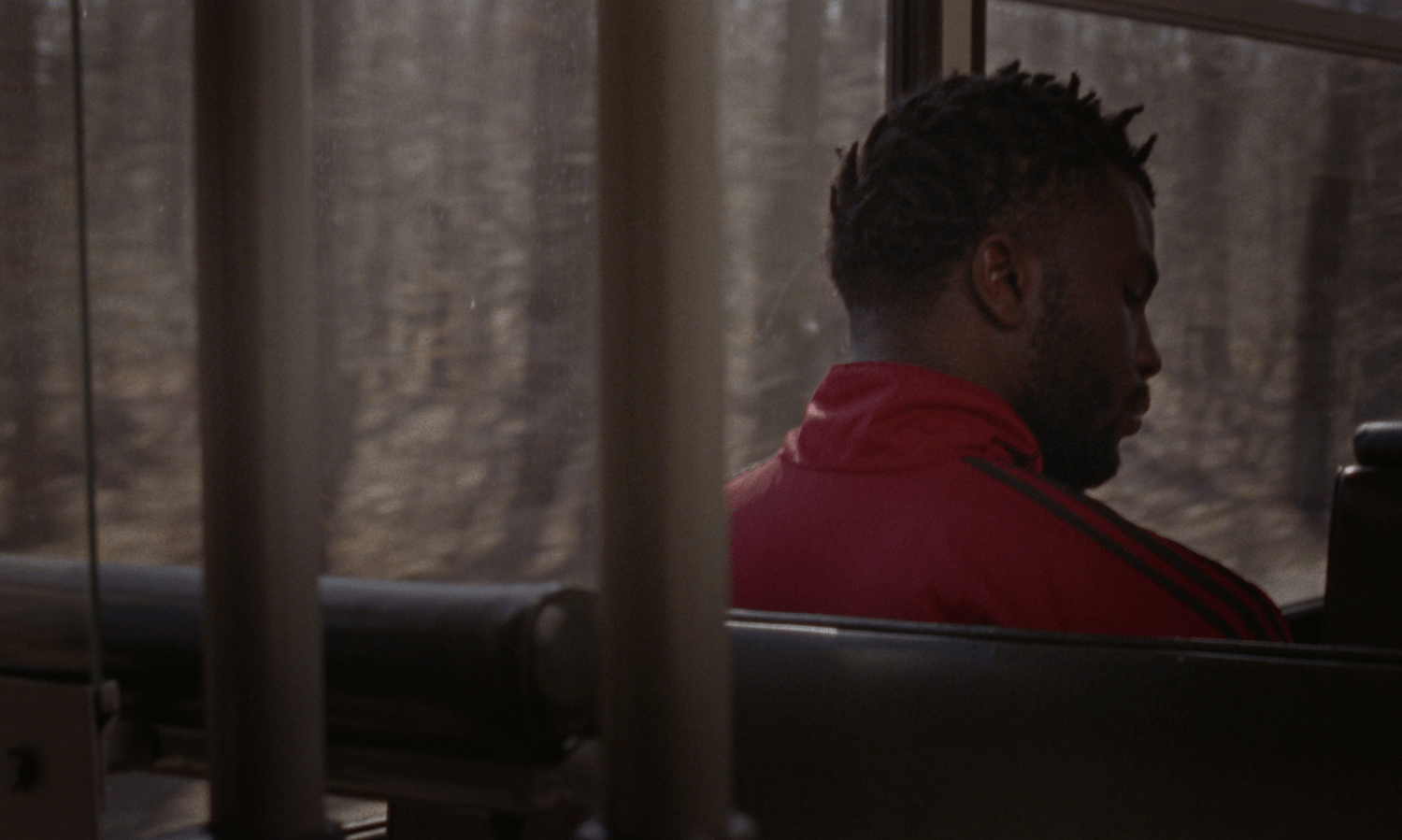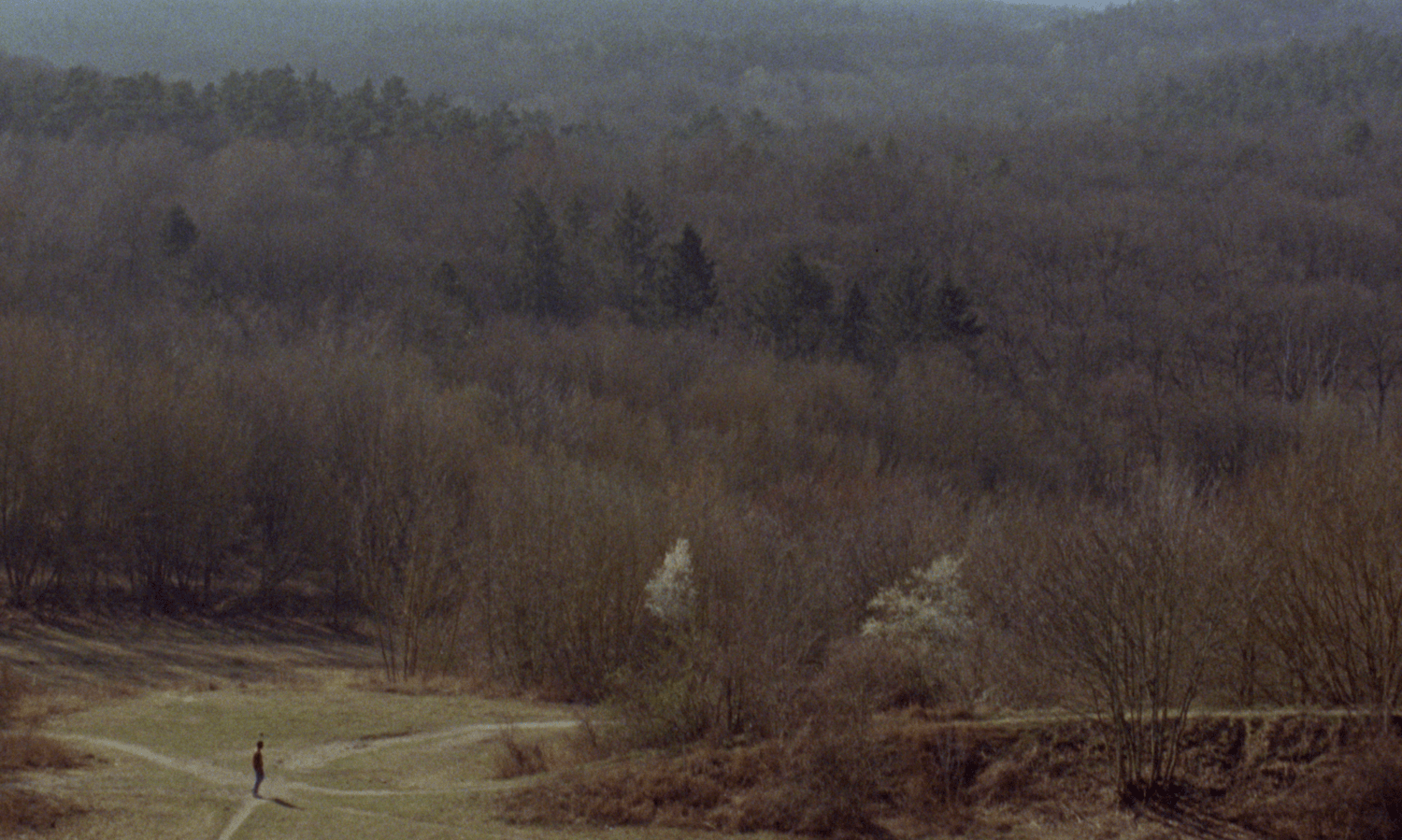Embracing Uncertainty
Carlos Pereira on Slimane
In Slimane, Carlos Pereira opts for a cinematic queerness to deconstruct mainstream ideas and perceptions of time and space.

I first meet Carlos Pereira centre frame and at a low angle on my screen. Dressed in a yellow pastel jacket and white T-shirt, his expression is gentle and inviting as he sits in a nook of his Berlin apartment. I just about make out an Ingmar Bergman film poster on the wall next to him. I thank him for his patience and apologise for the technical gremlins that crash every virtual meeting. Pereira later jokingly says, “How can I do slow cinema and not be patient?”
The Portuguese filmmaker’s most recent film, Slimane, demands exactly that of its viewers: patience. Approximately three-quarters of this 19-minute short is devoid of dialogue, resulting in a distorting experience of time. Here is an elliptical and slow-paced narrative that, at its core, is about love, grief, and liberation.
The film starts with Omar being released from prison. We follow him as he heads to the house of his friend Ava, where he learns that the majority of their friends have fled the country and that Slimane has been taken away. Their conversation unfolds languidly, the camera focusing not on their faces but on elements of detail: a dog, a limb, the wallpaper. We then watch as Omar rides a bicycle along a field of solar panels and disappears into a forest. Is this a quest to find Slimane? Is Slimane his lover? The elusive titular character remains tantalisingly absent throughout…
Pereira succeeds in portraying a bleak world through an atmosphere of detachment. Set in Germany, the film takes place in a “near future” in which queer people face severe discrimination. This, however, we understand through the synopsis rather than the film itself.
I confess that upon first viewing, the narrative left me puzzled. Pereira laughs, and my screen begins to shake: his laptop rests on his lap. “I prefer films to be felt, rather than understood,” he declares. I reply that a three-minute-long shot of blurry wallpaper for the film’s only scene of dialogue is a bold choice. My screen shakes again, and Pereira expresses with delight that this was precisely his intention: to make the absence of bodies unbearable, and thereby instill a longing for faces while creating a sense of intimacy. He proceeds to enthusiastically recount how a viewer told him that the absence of Omar and Ava on the screen allowed their voices to represent the broader queer community. While not intentional, this viewer’s experience aligned with Pereira’s aspirations.
Framing protagonists on the periphery is the director’s way of underlining his perspective on contemporary society: “It’s about understanding what it means when these [queer] bodies are taken away and erased from our collective memory,” he tells me. The fragility captured in Slimane, I begin to understand, stems from Pereira’s own personal experience of feeling unsafe and marginalised as a queer person.
The film’s elliptical narrative structure conveys the sense of a future in jeopardy, especially in an increasingly authoritarian European political landscape. “For me, a world where our rights are at stake and are being withdrawn is a world that feels old and stuck in time.” He explains that, with this principle in mind, he wanted to manipulate time to highlight the film’s political dimension. Both the choice to shoot on 16mm film, and locations such as a run-down house with outdated wallpaper and a disused prison, induce a sense of a world where the threat to queer rights produces a form of social stagnation.
In stark contrast to this lethargic atmosphere, the film concludes in a techno dance rave. When I ask about this ending, Pereira’s expression changes: his smile indicates he was expecting the question. “Of course, the end is about centring the body again, and about celebration.” Omar’s journey towards the centre of the frame mimics a movement towards self-assertion. Although his character’s situation remains almost unchanged on a narrative level—nothing substantial happened between his release from prison and the rave—Pereira believes that resistance lies in sheer bodily movement. So, while his protagonist may still face the unknown, the possibility to reinvent himself subsists.

Slimane (Carlos Pereira, 2023)
Slimane is defined by absence, yet this is not the first time Pereira explores this feeling. His storytelling is one of minimal dialogue, long takes, and slow pace. Two previous short films, Ghost Stories (2018) and Vulkan (2022), navigate the realms of uncertainty, leaving the viewer to infer meaning.
When I ask about artistic influence, the answer comes without a moment’s hesitation: “I love the work of Angela Schanelec; she’s one of my favorite directors”, he says with a glint in his eyes. For Pereira, Schanelec is one of the few people that make “true queer cinema in the sense of form.” Queerness, it appears, is not just a matter of narrative and representation, but one of cinematic form: pushing the boundaries of cinematic language, Schanelec’s films are known to disorient and challenge audiences. Deeply influenced by her approach to elliptical storytelling, Pereira opts for a similar type of disembodied dialogue in Slimane. This cinematic queerness is aimed at deconstructing mainstream ideas and perceptions of time and space. In Slimane, this leads to the creation of a fictional “safe space” set in the near future, aimed at raising awareness about potential threats to queer life.
Pereira believes this approach allows him to treat his films as an open dialogue, enabling him to gain insights into both his work and his self. For a brief moment, he seems lost in thought, then: “As a director, I feel like I’m building the space of a museum. I’m creating this building, but I would like the viewer to walk freely in this museum.” A generosity of spirit that can leave some enthralled and others keen on talking to a curator.
Like many an artist, Pereira is plagued with perpetual doubts and questions. Yet he sees filmmaking not as a pursuit of answers but as a continuous exploration of the unknown. He reveals that his process of crafting a film is driven by a sensorial impulse, and throughout our conversation, it is clear that he seeks to understand these emotions by experimenting with film.
Observations and interpretations from viewers help him discover new layers of meaning within his own work. He tells me he nearly quit filmmaking until a critic’s remark on Ghost Stories changed his mind: “It is a film of serene coexistence with uncertainty.” Pereira knows the exact phrasing by heart and confesses it had made him cry at the time: “I didn’t know what this film was about. But actually, it was a moment when I was coming to terms with the idea of uncertainty and jumping into the unknown.” Much like Omar, who finds joy as he dances in the dark, Pereira has come to embrace uncertainty, albeit at his own pace: “I think slow cinema forces me to be closer to myself.”

